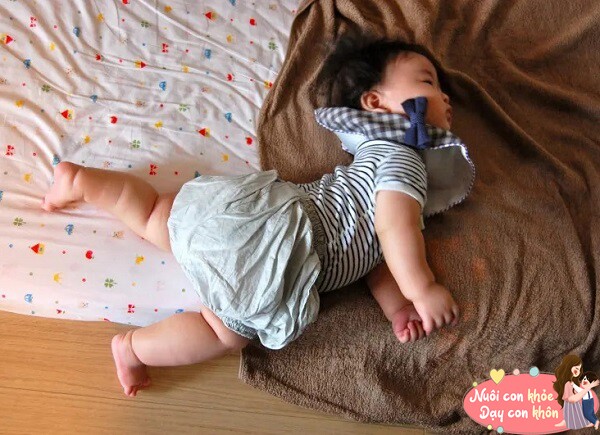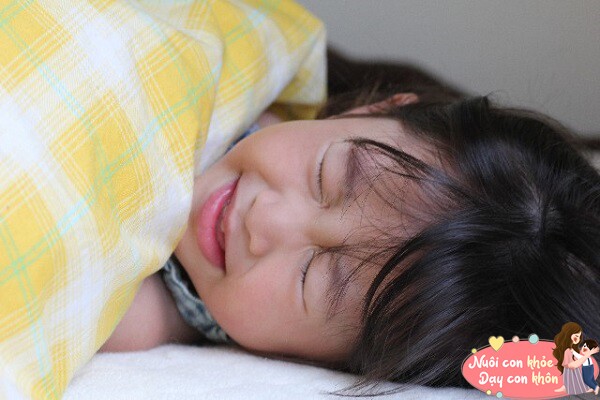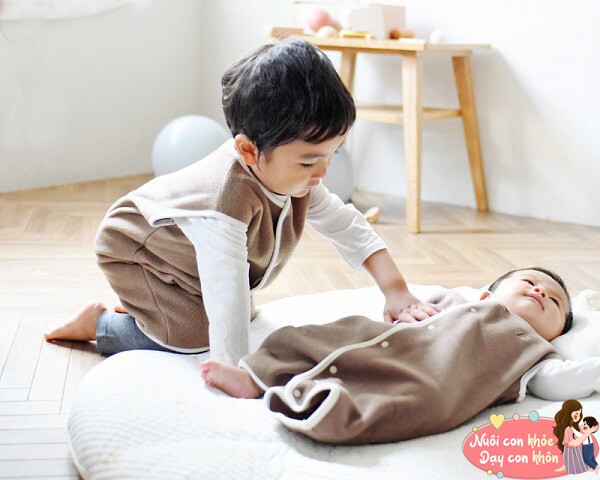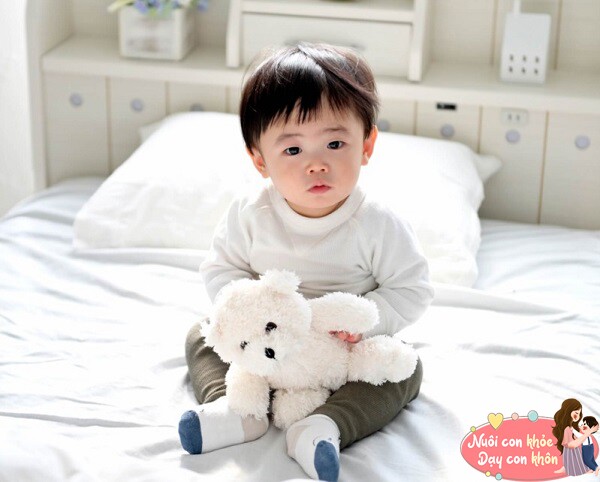We often don’t realize that these seemingly unintentional actions actually conceal the “small emotions” and “small thoughts” characteristic of a child’s innocent mind.
We all know that sleep is the most refreshing and relaxing time. Any change in mood can be reflected in dreams. If parents can interpret their child’s sleep state well, they will understand more about the child’s inner world.

Kicking the blanket during sleep
Most children will, to some extent, kick their blankets off at some point before gradually falling asleep.
In reality, what lies behind this behavior is an abundance of energy and vitality in children. During the day, they may not have had the opportunity to expend all their energy. So, when it’s bedtime, they instinctively release this pent-up energy.

Kicking the blanket during sleep.
Clinical studies also confirm that the brain’s “excitability” in children is significantly higher just before they fall asleep compared to during the day. This instinctive action helps children relieve the mental stress of the day, making them feel relaxed and comfortable as they drift off to sleep.
However, once the child is truly asleep, this “discomfort” will subside. So, parents need to be patient and wait for a while, allowing their child to overcome this restlessness and get a good night’s sleep.

Mouth open, pouting lips
We often observe that children sleep with their mouths slightly open or deliberately pouting. This truly reflects the purest aspect—the action of a “naughty” child seeking indulgence from their mother.
Scientific research suggests that this behavior may originate from infancy. At that time, children would unconsciously perform this action to seek comfort from their mother.
In reality, children rarely behave so openly when they are awake. But when they sleep, their true nature is revealed.
Children are unknowingly conveying to their mothers their simplest desires to receive more love and attention. Of course, mothers should also respond and satisfy these “small thoughts” within their children with affection.

Mouth open, pouting lips.

Clenching teeth, small hands hitting the bed
If your child occasionally clenches their teeth and hits the bed with their small hands while sleeping, be cautious. This indicates that the child is experiencing some sort of dissatisfaction and resentment.
This phenomenon is more evident in boys. This is because boys tend to be more active and irritable when they have excess energy.
During sleep, all the negative emotions of the child are unconsciously released through this type of behavior. This could be due to scolding, reprimanding, or some other form of punishment the child experienced during the day.
When a child exhibits such violent behavior in their sleep, mothers should pay close attention. The child’s stubborn character has clearly manifested in their dreams. If left unchecked, the child may become more impulsive and angry. At this point, mothers should pay special attention to the child’s psychological state and patiently guide them.

Clenching teeth.

Mumbling and humming
It is quite normal for children to occasionally grumble and hum in their sleep.
This indicates that the child is in a light sleep state. The main reason for this phenomenon is that the child encounters some difficulty in falling asleep and cannot fully relax.
The source of this difficulty could stem from various aspects, such as academic and life pressures, or it could be due to an argument with friends during the day. Regardless of the reason, the child is “signaling” to the outside world in this manner.
At this point, it is best for the mother to go to the child, offer patience and comfort, and inquire about what is bothering them. Only by eliminating this invisible mental pressure can the child sleep peacefully and embrace a fresh start the next day.

Lying in bed, refusing to get up
This is a very common scenario. When it’s time to wake up, children often avoid the call to get up by pouting and acting coy, remaining in bed.
Research shows that the biological rhythm of children differs from that of adults. Children tend to be more excitable at night and have difficulty falling asleep at the designated bedtime.
Once asleep, the child’s bodily functions enter a “deep sleep” state, making it challenging to wake up on time like adults.

Lying in bed, refusing to get up.
So, children are not deliberately staying in bed; it’s often due to their physiological needs. Just be patient, give them enough time to wake up fully, and they will obediently get up and start their day.
At the same time, children may linger in bed to seek a sense of security. For them, spending a little more time in the warm embrace of their bed is like spending more time in their mother’s arms.
This need for attachment and security is normal as children grow up. Mothers can help their children transition to a more alert state by making them feel loved and cared for through gentle words and touches.

Seeking specific soothing objects
Some children always like to hold a doll, a blanket, or a piece of their mother’s clothing while sleeping. This is indeed a form of psychological comfort they are seeking. These objects may represent security, warmth, and love for the child.
When children unconsciously seek these soothing items during sleep, mothers can gently help them find and hold onto these items. This way, children can fall into a deeper sleep more quickly and enjoy a good night’s rest.

Some children always like to hold a doll, a blanket, or their mother’s clothing while sleeping.
Children’s sleep hides many small emotions and thoughts. It is essential for parents to observe carefully, be patient, and explain to understand their children’s needs better and provide the necessary support.
By decoding their children’s sleep, parents can not only gain a deeper understanding of their inner world but also detect and address potential psychological issues timely. Let’s work together to create a healthy and happy environment for our children’s development.































